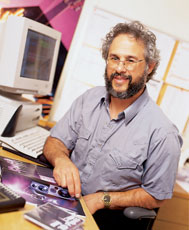|
|
A Time for Us |
April 2002 |
|
Until recently, music educators as a group have usually lagged behind when it comes to applying technology in the classroom, especially in the public schools. Public-school music teachers have tended to be conservative and uninformed about technology, and perhaps more important, school budgets generally are low even in good economic times, so getting school teachers and music-education departments to embrace technology and apply it in the classroom has been slow work.
Fortunately, the situation has improved significantly in the last three or four years. Home computing has entered the mainstream in our society, and many students and teachers use computers in their nonmusical pursuits, reducing the level of technophobia. In addition, computers have become more available to schools. One factor was the Clinton administration's attempts to wire the schools in to the Internet. Another has been corporate programs.
But there is a third, less known reason that music teachers in particular are beginning to embrace high-tech tools: support from private organizations and foundations. The primary organization that focuses on fostering the use of technology in both public and private music education is the Technology Institute for Music Educators (TI:ME; www.ti-me.org), which is mostly funded by a grant from NAMM and is cosponsored by the International Association of Electronic Keyboard Manufacturers (IAEKM; www.iaekm.org).
TI:ME's goals are to define the skills needed to understand and use technology for music education; to develop standards for in-service teacher training specific to music technology; and to develop course materials to teach sequencing, notation, computer-assisted instruction, and so on. The institute's Music Technology Certification Program tests for and certifies two skill levels, based on TI:ME's course materials and classes. (This year, the Institute will offer classes at 24 colleges in 14 states. For more information, see the Summer Study area on TI:ME's Web site.) Level 1 certification requires that a teacher demonstrate basic skills in music-notation and sequencing, computer-assisted instruction, multimedia, the Internet, and the use of electronic instruments in the classroom. Level 2 certification requires advanced skills in at least two of these areas as well as knowledge of how to integrate music technology effectively in the classroom.
In addition to its Web site, TI:ME has a newsletter and participates in conferences, notably the biannual Music Educators National Conference (MENC), which is a major trade show for public-school music teachers. At this year's national conference, held at the Nashville Convention Center from April 10 through 13, TI:ME will provide extensive technology sessions.
Teaching music teachers how to use technology in their work ’Äî and supplying them with the tools to do so ’Äî is in everyone's best interests. I strongly encourage everyone to support TI:ME and similar regional and local efforts, participate in programs for donating computers to schools, and otherwise further this noble effort. |
